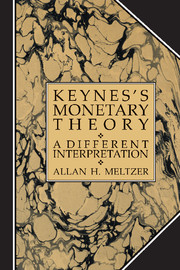Book contents
- Frontmatter
- Contents
- Preface
- 1 Introduction
- 2 Keynes in the 1920s: ideas, beliefs, and events
- 3 Theories, implications, and conjectures in the 1920s
- 4 The General Theory: a different perspective
- 5 Monetary reform and international economic order
- 6 Other interpretations of the General Theory
- 7 Conclusion
- References
- Index
- Frontmatter
- Contents
- Preface
- 1 Introduction
- 2 Keynes in the 1920s: ideas, beliefs, and events
- 3 Theories, implications, and conjectures in the 1920s
- 4 The General Theory: a different perspective
- 5 Monetary reform and international economic order
- 6 Other interpretations of the General Theory
- 7 Conclusion
- References
- Index
Summary
A main theme of this book is that the General Theory put into the language of economics beliefs that Keynes held in the 1920s. The beliefs concerned progress, the role of the state in achieving progress, the importance of investment for progress, and the harmful effect of uncertainty on investment and progress.
As early as 1924, Keynes gave a lecture at Oxford “The End of Laissez-Faire.” What I have called the main themes are there, not hidden as afterthoughts in a wide-ranging essay but as main ideas:
Many of the greatest economic evils of our time are the fruits of risk, uncertainty, and ignorance. It is because particular individuals … are able to take advantage of uncertainty and ignorance, and also because for the same reason big business is often a lottery, that great inequalities of wealth come about; and these same factors are also the cause of the unemployment of labour, or the disappointment of reasonable business expectations, and of the impairment of efficiency and production …
I believe that some coordinated act of intelligent judgment is required as to the scale on which it is desirable that the community as a whole should save, the scale on which these savings should go abroad in the form of foreign investments, and whether the present organization of the investment market distributes savings along the most rationally productive channels.
- Type
- Chapter
- Information
- Keynes's Monetary TheoryA Different Interpretation, pp. 303 - 321Publisher: Cambridge University PressPrint publication year: 1989



